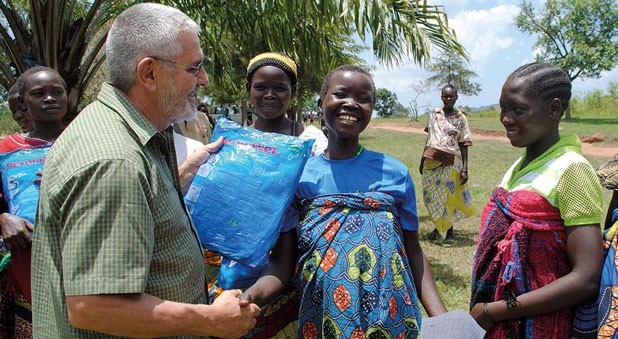Churches in the Democratic Republic of Congo (DRC) are among the world’s fastest growing, according to Eddie Ozols, the African Projects Manager for the Archbishop of Sydney’s Anglican Aid. But he says without outside support the new congregations are at physical and spiritual risk.
Mr Ozols has just returned from a six-nation visit to Africa to check on the organisation’s projects. In particular, he assessed the progress of programs in the Diocese of Aru, the newest of the nine dioceses in the DRC and one of the most impoverished. Anglican Aid supports dental health and anti-malaria projects as well as providing the majority of funding for Aru’s theological college, the main source of Bible training in the diocese. The entire college is run on less than $15,000 a year.
“I was privileged to meet the 19 students and learn that without support from Sydney, the Bible college would be non-existent.” Mr Ozols says. “The church in Aru is in a growth phase: 54 parishes, 300-plus congregations and the diocese seeking to train leaders. It is anticipated that 10 new parishes will be created this year as graduates from the college are appointed to relieve busy pastors who, in some cases, have over 10 congregations for which they are responsible.”
Another project, centred at Ekanga in Aru, has seen a significant drop in infant mortality due to anti- malaria nets.
“Two hundred and fifty children are born annually at the clinic and each mother receives a net during pregnancy due to heightened vulnerability to malaria,” Mr Ozols says. “Parents are also bringing children to the health centre much earlier as they are now aware of the symptoms.”
As in much of the Congo, government services are non- existent and church groups provide the majority of health, education and other community support services. “The provision of health and
services, even with minimal resources, is having a huge impact in the community.” Mr Ozols said.
An extensive dental health program in the DRC has long been supported by Sydney Anglicans, encouraged by former missionaries Graham and Wendy Toulmin.
In Aru particularly, dental hygiene is being improved through targeted messages aimed at children, and the information is having an impact on entire families. Mr Ozols is recommending an extension of the scheme to include construction of a dental clinic and clinical school to train dentists and nurses.
“Some of the students have been practising dentistry for over 20 years with no formal qualifications, and providing proper training will have impacts not only in Aru but in other areas of the DRC,” he says.
One of the most poignant aspects of support work in the DRC is the help being given to former child soldiers of Joseph Kony’s guerrilla group, the so-called “Lord’s Resistance Army”. After an international blaze of publicity in 2012, the world seems to have forgotten the suffering of children, some as young as seven, kidnapped and forced into terrorism.
At Faradge in the Aru diocese there is a project to integrate former LRA child soldiers into the community.
“Praise God, this program seems to be very effective”Mr Ozols says. “Forty-five children aged 14 to 17 have been given the mental, social, emotional and spiritual support they need after such traumatic experiences. But they still lack education and there are so many more LRA children who have returned but been unable to be integrated back into their communities.”
Feature photo: Eddie Ozols distributes insecticidal bed nets to expectant mothers at the Ekanga health project in Aru, DRC.
























